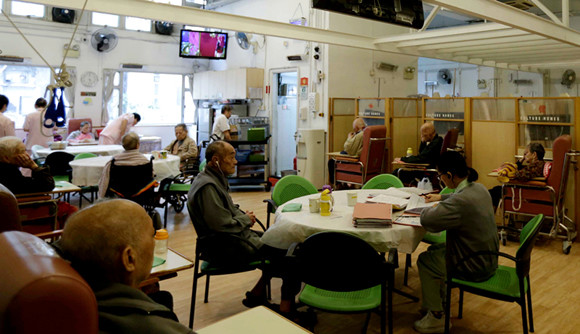
Seniors at a facility in Hung Hom district run by Culture Homes, a nursing home chain in Hong Kong, watch TV in the canteen. (Photo: China Daily/Roy Liu)
Varying quality
The quality of services offered in nursing homes in the city varies widely, according to an audit report published in October 2014. Public nursing homes, which receive extensive government funding, have always been popular, but the city's rapidly aging population means demand is rising rapidly.
In response, the government has started purchasing places in private nursing homes. However, seniors opting to take this path can still expect to wait as long as nine months.
For Lam, that's too long because he will need immediate help if his mother's health improves and she is discharged from the hospital.
However, the choice is limited to signing up for a place in one of the private nursing homes, which generally offer lower-quality services, or waiting for a place in a public nursing home, which is unrealistic.
Hong Kong has a relatively high admission rate for care homes, with 6.8 percent of seniors being admitted. That's between two and four times higher than in a number of regional neighbors, including Japan, Singapore and Taiwan.
Public versus private
Providing more places at public nursing homes has long been on the government's to-do list, but a shortage of land has restricted development. Moreover, it takes about five years to build a contracted nursing home once funding has been approved by the Legislative Council, which oversees the administration of the city.
"The number of residential care places provided by public nursing homes is already at a record high. The government shouldn't expend too much effort building more nursing homes. A quarter of the city's nursing homes are public establishments, which are heavily funded by the government," said Timothy Kwok Chi-yui, professor in the Department of Medicine and Therapeutics at the School of Public Health at the Chinese University of Hong Kong.
More than 80 percent of seniors who stay in private nursing homes receive social allowances such as Comprehensive Social Security Assistance and disability subsidy, he added.
Kwok is also director of the Jockey Club Centre for Positive Ageing, a nursing home that mostly provides care for people with dementia. He said that on average, the ratio of seniors to available beds is 15-to-1, almost double that in many countries.


















































